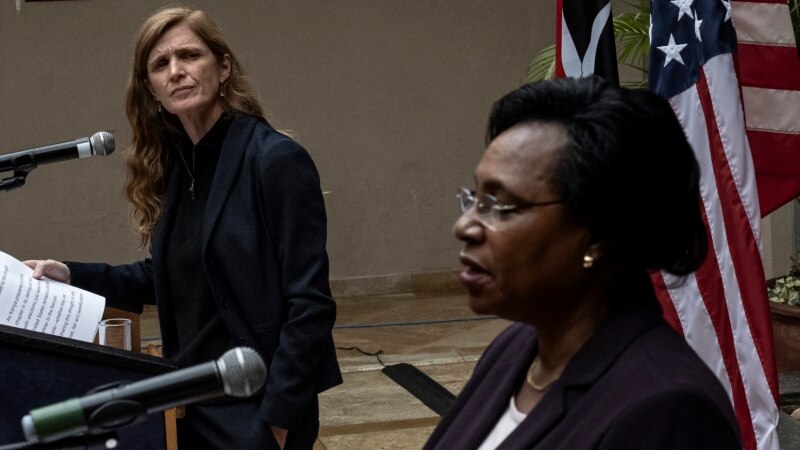U.S. aid officials are calling on countries in the Horn of Africa to speak out against the Russian government’s blockade of Ukrainian ports, which have held back grain exports needed to feed millions of hungry people in the region. Officials also are pleading with armed groups in Ethiopia, Somalia and South Sudan to allow free passage of foodstuff in areas under their control.
The U.S. government’s top aid officials are on a three-day visit to East Africa, where nearly 20 million people are in a state of severe hunger and food insecurity aggravated by the Russian invasion of Ukraine and cutoff of Ukrainian food exports.
In her first stop in the region, USAID Administrator Samantha Power, speaking in Kenya’s capital Nairobi, said a concerted effort is needed to overcome the regional humanitarian crisis.
Earlier in the week, Power announced $1.2 billion in new money for Ethiopia, Somalia and Kenya and spoke Friday of how the money will be dedicated to meeting the food crisis in Kenya.
“That’s an enormous sum of money and it speaks to the amount of need here, but again we need other donors to step as well,” Power said. “At the same time we try to mobilize those resources we need to be pushing for access to hard-to-reach areas, and no party to the conflict should be impeding the safe passage of humanitarian relief.”
Kenya will receive about $255 million of the latest U.S. contribution. Some 4.1 million people are food insecure in Kenya, up from 3.5 million in March this year.
Kenya’s minister for public service and gender Margaret Kobia said the government has been able to provide humanitarian assistance in the arid and semi-arid areas of the country.
“The government has been giving cash transfers since September last year,” Kobia said. “We feel that even for those who are moving from one location to another, cash transfer remains a mode that can reach them wherever they are so long as they have a telephone.”
The Horn is experiencing a drought that is leaving millions on the brink of starvation.
Humanitarian agencies operating in Ethiopia and Somalia are finding it challenging to access some parts of both countries because of conflict and hundreds of thousands of people have been forced to move to safer areas to get access to food, water and medicine.
The United Nations and Turkey have mediated a deal to free Ukrainian grain exports. But Power said African countries need to pressure Russia to make sure the exports reach their intended destinations.
“This is going to be a challenging period for this region even if the grains can be unlocked, but every voice on the continent and around the world should be crying out in unison to Vladimir Putin, ‘Let the grains go, let the grains go Mr. Putin,’” Power said. “This is a humanitarian catastrophe in the making and anything any one of us can do to alleviate that must be done.”
Somalia gets 90 percent of its wheat from Russia and Ukraine, and even those with money are finding it difficult to afford the food in the markets.
Aid agencies warn eight areas in Somalia are at risk of famine and more than 7 million people are affected by drought, which has wiped out pastures and livestock.

